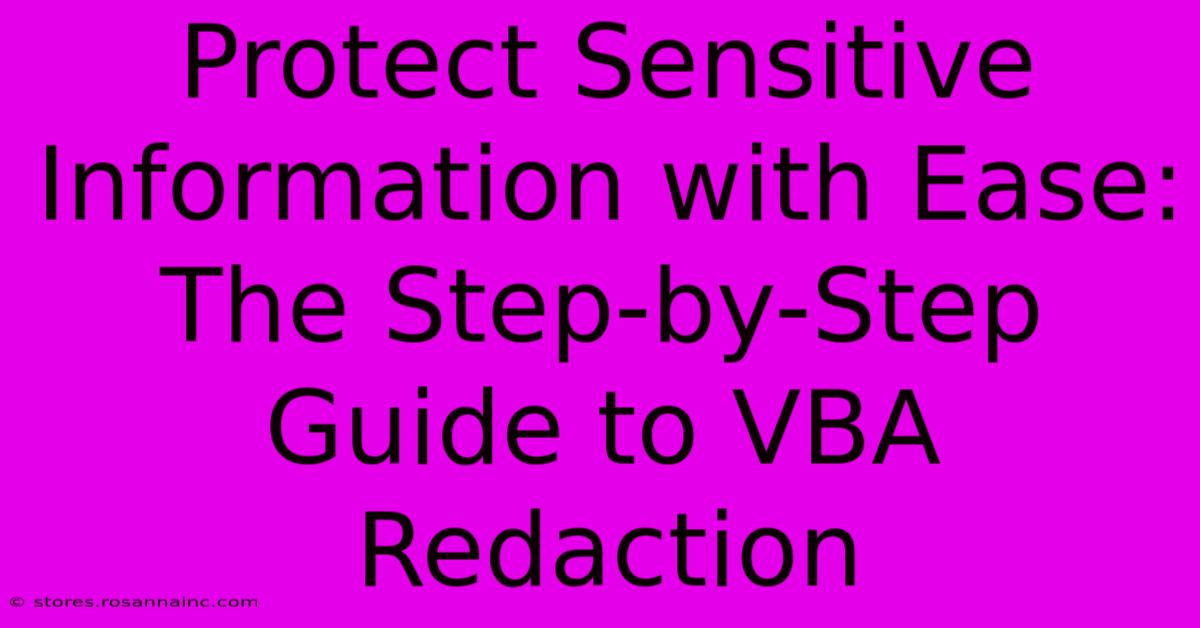Protect Sensitive Information With Ease: The Step-by-Step Guide To VBA Redaction

Table of Contents
Protect Sensitive Information with Ease: The Step-by-Step Guide to VBA Redaction
In today's digital age, protecting sensitive information is paramount. Data breaches can have devastating consequences, impacting individuals, businesses, and even national security. While various methods exist for securing data, redaction—the process of removing sensitive information—remains a crucial element. This comprehensive guide will walk you through creating a robust VBA (Visual Basic for Applications) redaction solution for Microsoft Excel, empowering you to safeguard sensitive data with ease.
Understanding VBA Redaction
VBA, Microsoft's built-in programming language, provides a powerful tool for automating tasks within Office applications. Leveraging VBA, we can create a custom macro that efficiently identifies and redacts sensitive data within Excel spreadsheets. This surpasses manual redaction, offering speed, accuracy, and consistency, significantly reducing the risk of human error.
Advantages of Using VBA for Redaction:
- Automation: Process large datasets quickly and accurately.
- Consistency: Apply consistent redaction across all documents.
- Customization: Tailor the redaction process to specific needs and data types.
- Security: Reduce the risk of human error and accidental disclosure.
- Repeatability: Easily re-apply the redaction process to new data.
Step-by-Step Guide to Creating a VBA Redaction Macro
This guide will cover the creation of a VBA macro that redacts specific keywords or phrases. You'll need basic familiarity with the VBA editor in Excel.
Step 1: Accessing the VBA Editor
- Open your Excel spreadsheet.
- Press
Alt + F11to open the VBA editor. - In the VBA editor, go to
Insert > Module.
Step 2: Writing the VBA Code
Paste the following code into the module:
Sub RedactSensitiveData()
Dim ws As Worksheet
Dim cell As Range
Dim redactTerms() As String
Dim i As Long
' Array of terms to redact. **Add your sensitive keywords/phrases here.**
redactTerms = Split("Confidential,Secret,SSN,Credit Card Number,Password", ",")
' Loop through each worksheet
For Each ws In ThisWorkbook.Worksheets
' Loop through each cell in the used range
For Each cell In ws.UsedRange
' Loop through each redaction term
For i = 0 To UBound(redactTerms)
' Check if the cell contains the redaction term
If InStr(1, cell.Value, redactTerms(i), vbTextCompare) > 0 Then
' Redact the cell by replacing the term with "REDACTED"
cell.Value = Replace(cell.Value, redactTerms(i), "REDACTED")
End If
Next i
Next cell
Next ws
End Sub
Step 3: Modifying the Code
redactTermsArray: This is the most crucial part. Modify theredactTermsarray to include all the keywords or phrases you need to redact. Separate each term with a comma. Consider adding regular expressions for more complex patterns.- Redaction Replacement: The code currently replaces redacted terms with "REDACTED". Change this to any other placeholder you prefer.
Step 4: Running the Macro
- Close the VBA editor.
- Go to the
Developertab (if you don't see it, enable it in Excel Options). - Click on
Macros. - Select
RedactSensitiveDataand clickRun.
Step 5: Testing and Refinement
Thoroughly test the macro on a sample spreadsheet before using it on sensitive data. Adjust the code as needed to ensure accurate and comprehensive redaction.
Advanced VBA Redaction Techniques
For more sophisticated redaction needs, consider these advanced techniques:
- Regular Expressions: Use regular expressions to identify more complex patterns and variations of sensitive data.
- Data Validation: Prevent sensitive data from being entered in the first place.
- File Encryption: Encrypt the entire file after redaction for added security.
- User Defined Functions (UDFs): Create reusable functions to perform specific redaction tasks.
Beyond VBA: Other Redaction Methods
While VBA offers powerful capabilities, other methods exist for redaction:
- Dedicated Redaction Software: Specialized software provides advanced features like OCR redaction for scanned documents.
- Manual Redaction: Though time-consuming and prone to errors, it's a viable option for smaller datasets.
Conclusion
VBA provides a highly effective and efficient way to redact sensitive information within Excel spreadsheets. By following this step-by-step guide and adapting the code to your specific requirements, you can significantly enhance the security of your data. Remember, data protection is an ongoing process, and regular review and updates of your redaction procedures are vital. Always prioritize security best practices and consider consulting with a cybersecurity professional for complex scenarios.

Thank you for visiting our website wich cover about Protect Sensitive Information With Ease: The Step-by-Step Guide To VBA Redaction. We hope the information provided has been useful to you. Feel free to contact us if you have any questions or need further assistance. See you next time and dont miss to bookmark.
Featured Posts
-
Pixelcut Pro Subscription Nightmare Users Report Membership Not Functioning
Feb 05, 2025
-
Tranquil Oasis Amidst Cityscapes Discover Hidden Gems In Perry Homes Dallas
Feb 05, 2025
-
Kiss Brittle Nails Goodbye The Gel Bottle Biab A Game Changer In Nail Health
Feb 05, 2025
-
Behind The Lens The Art Of Side Lighting In Film And Its Impact On Audiences
Feb 05, 2025
-
The Cinematic Canvas How Side Lighting Paints Visual Masterpieces
Feb 05, 2025
